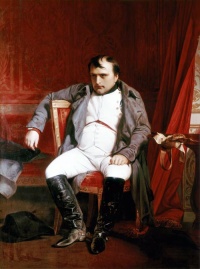Cult of personality
From The Art and Popular Culture Encyclopedia
| Revision as of 17:00, 12 April 2021 Jahsonic (Talk | contribs) ← Previous diff |
Revision as of 22:35, 10 July 2021 Jahsonic (Talk | contribs) Next diff → |
||
| Line 1: | Line 1: | ||
| [[Image:Napoléon Bonaparte abdicated in Fontainebleau.jpg|thumb|right|200px|''[[Napoléon Bonaparte abdicated in Fontainebleau]]'' (1845) by Paul Delaroche]] | [[Image:Napoléon Bonaparte abdicated in Fontainebleau.jpg|thumb|right|200px|''[[Napoléon Bonaparte abdicated in Fontainebleau]]'' (1845) by Paul Delaroche]] | ||
| {{Template}} | {{Template}} | ||
| - | A '''cult of personality''' arises when an [[individual]] uses [[mass media]], [[propaganda]], or other methods, to create an idealized, heroic, and at times, worshipful image, often through unquestioning [[flattery]] and [[praise]]. Sociologist [[Max Weber]] developed a [[tripartite classification of authority]]; the ''cult of personality'' holds parallels with what Weber defined as "[[charismatic authority]]". A cult of personality is similar to [[apotheosis|hero worship]], except that it is established by mass media and propaganda usually by the state, especially in [[totalitarian]] states. | + | |
| + | A '''cult of personality''', or '''cult of the leader''', arises when a country's regime uses the techniques of [[mass media]], [[propaganda]], the [[big lie]], [[spectacle]], [[the arts]], [[patriotism]], and [[government-organized demonstration]]s and rallies to create an idealized, heroic, image of a leader, often through unquestioning [[flattery]] and [[praise]]. A [[cult]] of personality is similar to [[apotheosis]], except that it is established by modern [[social engineering (political science)|social engineering techniques]], usually by the state or the party in [[one-party state]]s and [[dominant-party state]]s. It is often seen in [[totalitarian]] or [[authoritarian]] countries. | ||
| + | |||
| + | The term came to prominence in 1956, in [[Nikita Khrushchev]]'s secret speech ''[[On the Cult of Personality and Its Consequences]]'', given on the final day of the [[20th Congress of the Communist Party of the Soviet Union]]. In the speech, Khrushchev, who was the [[General Secretary of the Communist Party of the Soviet Union|First Secretary of the Communist Party]] – in effect, the leader of the country – criticized the [[Stalin's cult of personality|lionization and idealization]] of [[Joseph Stalin]], and by implication, his communist contemporary [[Mao Zedong's cult of personality|Mao Zedong]], as being [[Revisionism (Marxism)|contrary]] to [[Marxism|Marxist doctrine]]. The speech was later made public and was part of the "[[de-Stalinization]]" process in the Soviet Union. | ||
| + | |||
| ==See also== | ==See also== | ||
| * [[Charismatic authority]] | * [[Charismatic authority]] | ||
Revision as of 22:35, 10 July 2021

|
Related e |
|
Featured: |
A cult of personality, or cult of the leader, arises when a country's regime uses the techniques of mass media, propaganda, the big lie, spectacle, the arts, patriotism, and government-organized demonstrations and rallies to create an idealized, heroic, image of a leader, often through unquestioning flattery and praise. A cult of personality is similar to apotheosis, except that it is established by modern social engineering techniques, usually by the state or the party in one-party states and dominant-party states. It is often seen in totalitarian or authoritarian countries.
The term came to prominence in 1956, in Nikita Khrushchev's secret speech On the Cult of Personality and Its Consequences, given on the final day of the 20th Congress of the Communist Party of the Soviet Union. In the speech, Khrushchev, who was the First Secretary of the Communist Party – in effect, the leader of the country – criticized the lionization and idealization of Joseph Stalin, and by implication, his communist contemporary Mao Zedong, as being contrary to Marxist doctrine. The speech was later made public and was part of the "de-Stalinization" process in the Soviet Union.
See also
- Charismatic authority
- Dictatorship
- Great man theory
- Supreme leader
- Leaderism
- Imperial cult (in the Roman Empire)
- Imperial Presidency
- Narcissism
- Narcissistic leadership
- Toxic leader
- Celebrity

